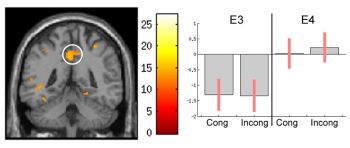Broadcast: News items
Alzheimer gene may boost young brains but contributes to ‘burnout’ in later years
Posted on behalf of: University of Sussex and BSMS
Last updated: Monday, 12 November 2012

Brain activity in those with APOE e4 gene is more marked in the region of the brain associated with tasks involving attention.
A gene that confers a higher risk for dementia in old age could also promote better-than-average memory and verbal skills in youth, according to a new University of Sussex-led study.
Neuroscientists tested the cognitive abilities of those with a particular gene variant, known as ‘APOE e4’, found in approximately 25 per cent of the population, against those without it. They also looked at the brain structure and brain activities of both groups during the tasks.
They found that young people with the e4 variant performed better in attention tests (one involving episodic memory of words, the other requiring participants to spot number sequences), which correlated with increased task-related brain activation as detected by MRI scans. The researchers also noticed subtle differences in the white matter of the brains of those with the variant.
Lead researcher Professor Jennifer Rusted said: “Earlier studies suggested that those with the e4 variant outperform those without it in tasks such as memory, speed of processing, mental arithmetic and verbal fluency.
But it is also well-established that this gene is a risk factor for Alzheimer’s disease. The suggestion is that while this confers cognitive advantages in early life, leading to higher achievement, it may also increase susceptibility to memory failure as we enter old age.
“Our study is the first to show that subtle differences in the structure and activation of the brain during cognitive tasks in APOE e4 carriers are linked to their cognitive performance. It is possible that the brain over-activations that we see in youth have negative effects over the longer term and contribute to a kind of ‘burnout’ in older adulthood.”
‘APOE e4 polymorphism in young adults is associated with improved attention andindexed by distinct neural signatures’, by Professor Jennifer Rusted, Dr Simon Evans and Dr Sarah King in the School of Psychology, Dr Nick Dowell and Professor Paul Tofts in the Clinical Imaging Sciences Centre at the Brighton and Sussex Medical School (BSMS), and Dr Najo Tabet in the BSMS Institute of Postgraduate Medicine, is published in NeuroImage.
The study was funded by the BBSRC (Biotechnology and Biological Sciences Research Council).
For more information about the project, see Psychology Showcase.

